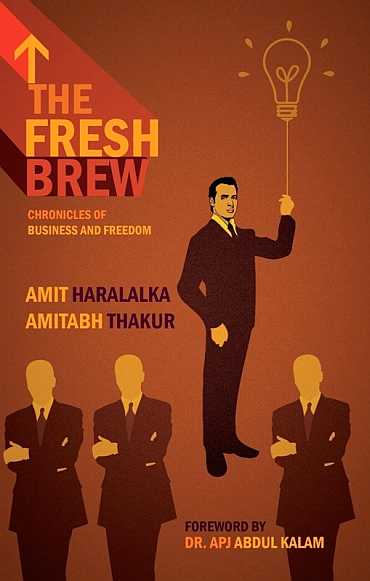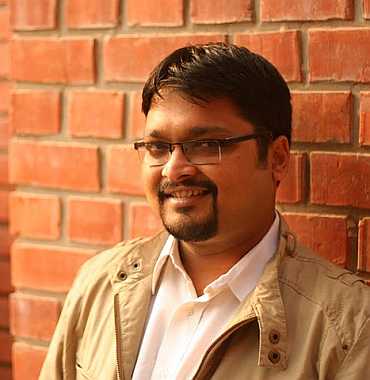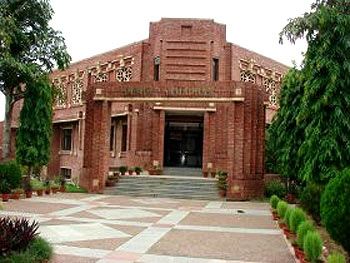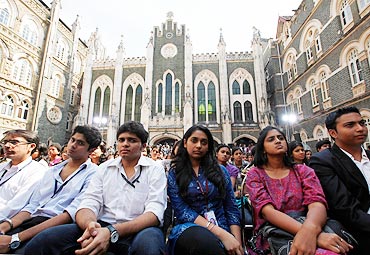 | « Back to article | Print this article |
'India now needs more job creators than job takers'
For most of us self-belief doesn't come easily. One needs to come out trumps against odds, against people who don't believe in your effort and who try to run you down.
It also comes when you are committed to a cause, have a never-say-die attitude and are willing to put in that extra bit of hard work to the extent that you sleep not more than three to four hours a day, on an average, in your bid to complete a book before you graduate out of a prestigious Indian Institute of Management.
Blogger-turned author, engineer, IIM graduate and now a management consultant with PwC (formerly PricewaterhouseCoopers), Amit Haralalka, has started believing in himself in the course of writing The Fresh Brew: Chronicles of Business And Freedom.
"The most important thing I learned is self-belief," says 27-year-old Amit candidly when asked about the lessons he learned while writing this book.
Amit and IPS officer Amitabh Thakur, both IIM Lucknow alumni, co-authored The Fresh Brew: Chronicles of Business And Freedom, a book that captures stories of 25 IIM Lucknow alumni who followed their heart, dreams and passions.
The book, published by Alchemy, with a foreword from former President Dr APJ Abdul Kalam, is the story of 25 entrepreneurs who, in their "restlessness", gave up lucrative careers in banking, marketing, consulting and technology firms to chart out an independent journey for themselves.
Prasanna D Zore caught up with Amit during a book-reading session in Mumbai and discussed the idea behind this book, the challenges the authors encountered to complete the book, the lessons Amit learned during this mental ordeal and the Fresh Brew Social Entrepreneurship Award which the authors have instituted to encourage social entrepreneurs.
Tell us how did this book happen? You are an MBA student and Amitabh is an IPS officer?
We were both batch mates at IIM Lucknow. He was a fellow at Fellow Programme in Management and I was doing my MBA. We joined the campus in the same year in 2009. Sometime towards the middle of 2010 he had sent a mail to the entire IIM Lucknow alumni saying that we should write a book like Stay Hungry, Stay Foolish which was the effort of the students of IIM Ahmedabad. He suggested we write a similar book on entrepreneurs from IIM Lucknow.
I got in touch with him and said that we can co-author the book. That was just perfect as he agreed to it in the first instant. I'd been a blogger before this and also worked with a start-up so I knew how entrepreneurs think and, I thought, personally for myself it would be an enriching experience and the extension of my hobby.
How did you collaborate on this book with Amitabh Thakur?
The association of someone with an MBA background with an IPS officer was very complementary. Also, the fact that he is older than I am and he has served in the IPS for about 18 years; he is from the 1992 batch UP cadre. He, of course, brought with him a lot of experience, knowledge, the wisdom of dealing with lots of different situations being an IPS officer and I was young with lot of energy and passion.
This way we complemented each other a lot. He brought to the table his wisdom and experience. I was this young, brash chap, full of ideas.
'The common strand that all these 25 entrepreneurs share is restlessness'
How did you go about choosing these 25 entrepreneurs?
We have been trying to make our selection as diverse as possible, in the sense that there are people who are into sports, music, Bollywood, and people who are businessmen as well.
Firstly, we wanted a selection which was across batches covering young and old entrepreneurs. Secondly, we wanted to have good mix of entrepreneurs from different sectors. While we have creative entrepreneurs like musicians and filmmakers we also have more traditional entrepreneurs who are purely into making their own businesses.
Because I was a member of the alumni committee I had developed a fair idea of the start-ups that happened from IIM Lucknow and I had their entire database.
What were the criteria for selecting these 25 stories? Their struggles and / or success?
All the entrepreneurs featured in our book are successful people but the degree of success was not the only criteria on which we decided to include a particular entrepreneur. I won't say that these 25 people are the most successful people that IIM Lucknow has produced but these are the 25 people who within themselves are diverse stories that can make a good reading.
What is the common strand that runs through all these 25 stories?
The common strand that all these 25 entrepreneurs share is restlessness. These people don't want to accept the things the way they are, no matter how good they are because they always want to make it better. It is this restlessness that makes people stand apart and there are a lot of learnings for me from their stories.
The process of writing their stories, interacting with them made me realise that people who are really successful will never stop at x = 10. If they are x = 99 they will try to make it x = 100. If they are x = 100 they will want to make it x = 110. All these people don't believe in status quo. If this is what is normal then I don't want this; I want to surpass the normal is the common strand that runs across all the 25 stories in this book.
'As it is you spend sleepless nights doing an MBA'
What kind of challenges did you face while writing this book?
The challenges were to find time with these 25 people because they were all extremely busy. So ensuring that we manage to meet all of them in a given time period and at the same time managing our studies and classes was one big challenge.
The second challenge was more important for me because I was doing my MBA, which is an extremely hectic course at IIM Lucknow. As it is you spend sleepless nights doing an MBA and trying to write a book and wanting the book to come out even before you graduate leads you to spend even more sleepless nights.
For pretty much of last year I haven't slept (enough) in the sense that I didn't sleep for more than three to four hours every night on an average. To make up for this I'd sleep for say ten hours on a Saturday or a Sunday and try to make up for the lost sleep.
This was to ensure that I stick to my commitment to myself and this book was out before I graduated. On the last day of the college I was signing books for all my batch mates. It was a very satisfying experience.
What is your future plan?
Right now I am looking forward to a career in consulting with a top consulting firm. I got placed with PwC during campus placement. So I have just come out of campus and I am excited about doing good work in the area of consulting.
Will you continue writing once you begin your career as a consultant?
Possibly, because it is a hobby. I will definitely try to explore areas which interests me and the reason why I felt like writing this book was that I felt there is a gap in this space and by a gap I mean that India got to a stage where lot of people are trying out new things, doing work that is out of the ordinary but the gap exists in the fear of taking that leap or not taking that leap. This book fills that gap by showcasing how these entrepreneurs overcame this fear.
'There were a lot of agents who said that this book is not going to work'
How did you find a publisher? Was it very difficult?
It was difficult. There were times when I didn't know what to do, where to go because this was my first experience as an author. So I didn't know how to find a publisher. But there were a lot of agents who said that this book is not going to work... dum nahi hai (The book won't be a hit)... but the important thing was not to get demoralised.
Fortunately Dr APJ Abdul Kalam agreed to write the foreword and then things started snowballing. When that happened I got offers from bigger publishing houses but I had already signed a contract and was obliged to fulfil my commitment.
By the end of it I had an offer from the largest publishing house in India as well as Alchemy, which is founded by the same people who started Rupa & Co earlier. But I had already signed up with Alchemy.
What did Dr APJ Abdul Kalam tell you?
Once the book was launched I went to meet him and was at his place for some time. I presented the book to him formally, thanked him for having written the foreword. He was obviously very happy.
He said that books like these need to come out even more and asked me about my future plans. I told him about my consulting job in my quest to become financially independent. He appreciated me for thinking that way. But he also asked me to make sure that I also became a job creator (rather) than a job taker.
He said that India now needs more job creators than job takers. He asked me to exploit all the opportunities I can to create more jobs. I completely agree with what he said.
'The most important thing I learned is self-belief'
What lessons did you learn writing this book?
The most important thing I learned is self-belief. Although I have been a blogger for four years it's hard to get a book of this kind because the volumes of book that are sold in India are relatively low compared with the West. And for first- time authors it is increasingly difficult to get across to publishers and get noticed.
However, writing this book taught me to persevere and pursue despite all obstacles. For the first-time authors there are bound to be obstacles, no one will take you seriously. In fact, when I started writing this book people within the IIM Lucknow community didn't take me seriously at all.
At an IIM there are a lot of smart people who come in. Everybody is bubbling with ideas and enthusiasm to do stuff. But a lot of things don't materialise, lose steam on the way and don't end up completing the task at hand. So it's important to take an idea from conception and execute it.
Apart from being emotionally satisfying how financially remunerative was this exercise?
What I would like to say is that both me and my co-author have decided to contribute a huge chunk of whatever we make -- committed more than what we will possibly (earn) depending on how many books we sell -- to constitute a social entrepreneurship award with the E-Cell (Entrepreneurship-Cell that encourages entrepreneurial spirit by seeding, incubating and disseminating knowledge to convert ideas into self-sustaining business ventures) of IIM Lucknow. So we have committed that sum and if we make less than this money that we have committed then we will make do for the difference from our own pockets.
I would not call them success stories but these are stories also about the struggles that go behind the successes and of people who have been independent who did their own stuff despite enormous risks.
How should young MBA aspirants approach CAT 2011?
When I took CAT three years ago it was a 'pen-and-paper' CAT, now it is an 'online' CAT, so I don't know how that changes your approach.
But in a competitive exam we always try to be very comparative throughout the preparation phase. So during the preparation stage one should just focus on the basics and not think about how am I doing relative to the competition. Then of course there are tests in the end that make you (fit to) match (the competition).
What is the Fresh Brew Social Entrepreneurship Award?
The amount the winner will get is a token amount which again will be decided by the E-Cell at IIM Lucknow. They have an annual event on entrepreneurship called Nirvan. The E-Cell of IIM Lucknow has an advisory panel drawn from the faculty of IIM Lucknow and entrepreneurs who studied at IIM Lucknow.
These people will invite the applications for social entrepreneurship and business plans during or a month before Nirvan. This advisory board then will judge the list of entries and come up with a short list. These candidates then will be asked to come to Lucknow and present their ideas at the end of which they will be deciding the winner and giving them the Social Entrepreneurship Award.
While the amount is a small token the entire idea is to encourage and motivate social entrepreneurs.
Would you want to become a social entrepreneurs a few years down the line?
I definitely would want to be in a position where I am driving change but as of now I don't have a business plan in place right now. But I am not ruling out doing that going forward. But right now I am starting my career as a consultant and looking forward to proving myself as a management consultant.




